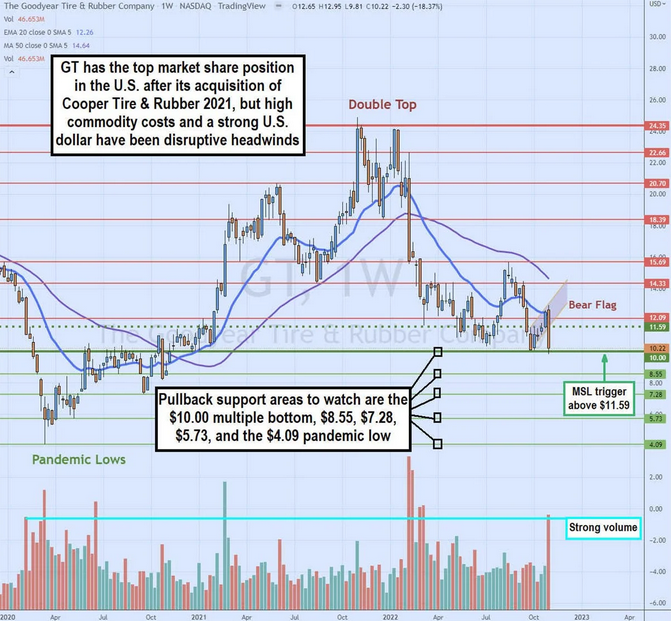
- All Instrument Types
- Indices
- Equities
- ETFs
- Funds
- Commodities
- Currencies
- Crypto
- Bonds
- Certificates
Please try another search

Goodyear Tire & Rubber Stock Becoming a Mighty Good Bargain

- Goodyear Tires owns the top market share of replacement tires in the U.S.
- Cost inflation and strong dollar have been negative headwinds c
- Goodyear Tire shares trade at 7X forward earnings
As one of the largest tire manufacturers in the world, Goodyear Tire & Rubber (NASDAQ:GT) was hit hard during the pandemic when commuters stayed off the roads under stay-at-home mandates. Shares fell as low at $4.09 in March 2020. The reopening triggered a spike in automobile sales and commuter traffic driven by pent-up demand as the spread of vaccinations enabled economies and businesses to reopen. Rideshare companies Uber (NYSE:UBER) and LYFT (NASDAQ:LYFT) were also big benefactors in the reopening as commuters who opted not to drive or take public transportation returned to the roads. Supply chain disruptions, logistics challenges, and soaring cost inflation also were mitigated by the strong pent-up demand. While inflation continues to be a troubling headwind, rising interest rates and a strong U.S. dollar have been the bigger problems as they start to impact the top and bottom lines after a record 2021.
Strong Dollar Strikes Again
The strong U.S. dollar impact shrunk Goodyear Tires' net sales from 15% in constant currency to 8% in Q3 2022. It has also made it difficult to forecast projections for European sales, especially with the potential of a recession looming. Shares have fallen by (-53%) in 2022 losing over half its value from the peak at $24.89 in November 2021. Goodyear shares were frothy at those levels, but the drop in share prices nearing single digits makes for a compelling value proposition as it returns to 2020 price levels. Since then, Goodyear completed its acquisition of rival Cooper Tire & Rubber in June 2021 surpassing Michelin (OTC:MGDDY) as the top tire manufacturer in the U.S. In essence, buying GT stock is like getting two (complementary) companies for the price of one.
Cooper Tire & Rubber Synergies
The merger of Goodyear and Cooper has been accretive and synergistic in a multitude of ways due to its complementary business models, products, distribution channels, and organizational structures. It sealed Goodyear’s market share at the top spot in the U.S. and doubled its presence in China. It added broader distribution to Cooper throughout Goodyear’s 2,500 stores. The complementary brands complete the portfolio spectrum of Goodyear OEM and premium tires along with the mid-tier power of the Cooper brand, which specializes in the light truck and SUV segments. Up to $165 million in run-rate cost savings are expected within two years of the acquisition. Cost synergies are mostly derived from overlapping corporate functions and operating efficiencies in addition to generating a net present value of at least $450 million utilizing Goodyear’s U.S. tax attributes, which reduce cash tax payments. Goodyear not only sells tires, but also auto services that cover oil changes, brakes, batteries, and tire repair, replacement and alignment services. These value-added services can now to sold to existing Cooper Tire customers. The combination increases its scale to support investments in new mobility and fleet solutions.
Bigtime Support Test at $10
The weekly GT chart illustrates the double top formed in the $24 achieved in January 2022 and the steep decline since then. Shares had the largest volume in two years collapsing from $22.66 to $15.69 in February 2022 as the Q1 earnings revealed the impact of headwinds. The sell-off caused the weekly 50-period exponential moving average (EMA) to break down through the weekly 50-period MA at $18.39. The weekly 50-period EMA is now a resistance falling at $12.26 followed by the 50-period SMA at $14.64. Shares initially bounced off the $10.00 support level in late September to October with higher rising lows hitting $12.95 highs heading into its Q3 earnings report, only to trigger a bear flag as shares collapse back down to retest the $10.00 support level in the earnings release on strong volume. The $10.00 level is a strong psychological support that needs to hold. Bulls need a bounce back through the $11.59 weekly market structure low trigger to reverse the downtrend. If the $10.00 support level breaks down, then valuation becomes more compelling at each pullback support level starting at the $8.55 and $7.29 swing low followed by the $5.73 and $4.09 pandemic low.
The Slowdown
On Oct. 31, 2022, Goodyear released its fiscal third-quarter 2022 results for the quarter ending September 2022. The Company reported an earnings-per-share (EPS) profit of $0.40 versus consensus analyst estimates for $0.55, a (-$0.15) miss. Revenues rose 7.6% year-over-year (YoY) to $5.31 billion missing analyst estimates for $5.34 billion. The Company achieved a record price/mix of $742 million helping it outpace higher raw materials costs. Net sales rose 8% but without adjusting for foreign exchange it would have been closer to 15%. The Company was able to offset rising input costs with 15% price hikes. Tire volumes fell (-3%) and CEO Richard Kramer expects the challenging environment to continue into 2023. While cost inflation may be peaking raw materials costs are expected to rise $500 million in Q4, and energy prices are expected to rise. Some of the rising raw costs in the third quarter are being pushed into the fourth quarter. The Company expects $300 million to $400 million in YoY cost increases to hit in the first half of 2023 with the majority in Q1 2023.
Related Articles

The markets have been sluggish this week as investors hope for a jolt later in the week when AI juggernaut NVIDIA Corporation (NASDAQ:NVDA) reports fourth quarter and year-end...

On Friday, a wave of selling pressure swept across the US equity markets, leaving a trail of losses. The S&P 500 closed down 1.7%, the DOW slid 1.69%, and the NASDAQ tumbled a...

Palantir remains highly valued with a 460x P/E ratio and a 42.5x P/B ratio, far above its peers. The stock's beta of 2.81 signals high volatility, meaning sharp moves in both...
Are you sure you want to block %USER_NAME%?
By doing so, you and %USER_NAME% will not be able to see any of each other's Investing.com's posts.
%USER_NAME% was successfully added to your Block List
Since you’ve just unblocked this person, you must wait 48 hours before renewing the block.
I feel that this comment is:
Thank You!
Your report has been sent to our moderators for review





Add a Comment
We encourage you to use comments to engage with other users, share your perspective and ask questions of authors and each other. However, in order to maintain the high level of discourse we’ve all come to value and expect, please keep the following criteria in mind:
Enrich the conversation, don’t trash it.
Stay focused and on track. Only post material that’s relevant to the topic being discussed.
Be respectful. Even negative opinions can be framed positively and diplomatically. Avoid profanity, slander or personal attacks directed at an author or another user. Racism, sexism and other forms of discrimination will not be tolerated.
Perpetrators of spam or abuse will be deleted from the site and prohibited from future registration at Investing.com’s discretion.